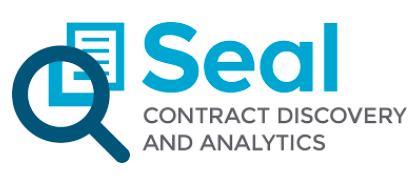
Legal AI company Seal Software recently merged with its long-time partner, Apogee Legal, amid a flurry of activity that included a partnership with DocuSign and a huge investment to help fund further growth (link to previous story).
Artificial Lawyer caught up with Jim Wagner (pictured above), the co-founder and managing director of Apogee, who is now the Chief Strategy Officer (CSO) of the combined companies to find out some more.
Let’s take it from the top: why do this deal? To understand that we need to dig a bit deeper into how the two companies fit together and what they did as separate businesses.
Wagner begins by saying that Seal, which has tended to focus on serving corporates with its legal AI review and analysis capabilities, ranging from inhouse teams to sales and procurement divisions, was built from the ground up to serve very large businesses.
He notes that dealing with a big corporate, in some cases global in scale, is very different to working with even the largest law firms. There are a range of issues, such as the sheer volume of data a global corporate may give you to review, then there are the security standards and hurdles to get over, and then the entire procurement process itself, which can be very demanding.
Over the years of its growth Seal has become a great platform for serving the natural language processing (NLP) analysis needs of these clients and has been focused on working with the tough tech standards that global corporates operate by.
Apogee on the other hand has focused on building the NLP ‘tool kits’ that can then be used on the Seal platform, for example to analyse GDPR issues, sales documentation, or mandates related to new accounting standards.

This is one reason why the two companies have worked closely together since 2015. And it therefore made perfect sense to simply integrate the two together into a single business.
‘Seal does NLP, but our ability is to add additional layers of analysis,’ explains Wagner.
Apogee, before the merger, spent a huge amount of time and energy really getting into the details of each NLP use case for certain types of document and particular information it may contain, training up the software to find and analyse at a very granular level that Seal was not always as focused on.
‘Apogee has used a more specific level of NLP to meet very detailed requirements, providing a richer level of information,’ Wagner adds.
One might say that Apogee’s NLP ‘tool kits’ are a bit like a ‘mod’ in a computer game. The game has a core platform, i.e. Seal, while Apogee is the special modification built by a developer that allows you to do new, special things on that platform.
Looking at the deal in these terms then it totally makes sense. The deal sees in excess of 30 staff joining Seal, giving the company around 250 in total. The main Apogee office in Charlotte, North Carolina, has become the kernel for the Seal Analytics Production Group, under the leadership of another Apogee co-founder, Matt Miller. This move also sees over 20 additional IT-literate lawyers joining Seal, thus continuing to increase its legal domain expertise.
So, what’s next? This is a good question to ask its new CSO – as it will be very much Wagner’s views, along with founders of Seal, that influence what happens next.
Wagner notes that with Seal’s recent huge injection of capital it can do a lot. It can expand into new markets, hire new machine learning experts, invest more in business development, create new products….the list goes on.
It can do all the things that some of its smaller competitors want to do. And that’s a nice place to be.
As Wagner says: ‘If we were going to jump on a train then Seal was clearly the best one to get on.’
But, it’s not all about having money to spend. It’s about the clients.

‘This is not just about finding a clause in a contract, it’s about giving better insight. It’s about providing corporates with some real ROI on their investment in AI,’ says Wagner.
‘We want to get as close to the ‘last mile’ for clients as possible,’ he adds, referring to the well-known challenge of what happens once the software has completed its review.
What happens then? How is this extracted data made useful? How do you make this flow into the rest of the business in an efficient and effective manner that really makes things better for the company, not just produce a huge new load of data for tired inhouse lawyers to wade through?
Wagner says that they are ambitious about where they can take things. He says it would be great to get to the point where there was no human intervention at all in the review/analysis process.
‘We want to be in the business of delivering answers to the clients, not teeing up the lawyers to start their work,’ he states emphatically.
And as to the wider market? How does he see this changing?
‘Every large law firm in three years will be using AI as part of their contract review or negotiation process,’ Wagner says, and given current growth rates this could well be right.
And, picking up a point Artificial Lawyer has championed, Wagner notes that we may get to the point where if you don’t use an AI system to conduct review work, such as in M&A due diligence, then a lawyer may be raising ethical issues.
This is because a well-trained NLP system will, especially across a very large document set, generally be far faster and at least – if not more accurate – than a room full of junior contract lawyers/paralegals. I.e. not to use an AI system means forcing the client to pay more, potentially with worse results. Surely something that legal regulators would not want to support…?
Wagner goes further though, adding that use of an AI system could be seen as ‘a backstop’, which helps insure against risk. Powerful stuff.
And the last question: will we see more merger deals with Seal? Wagner keeps his cards close to his chest: ‘I can’t say. But, we are in this for the long-run.’
In short, Seal may be one of the most established legal AI companies in the market, and have done some spectacular deals recently, but in the wider scheme of things, what has come before is really just the beginning of the story.
The legal world is changing, using AI and automation for efficiency and greater business effectiveness is just starting to get established. And, as this $750 billion market evolves, Seal and its new CSO Wagner, plan to play a pivotal role in this process.
And it looks like they have every chance of success.
2 Trackbacks / Pingbacks
Comments are closed.